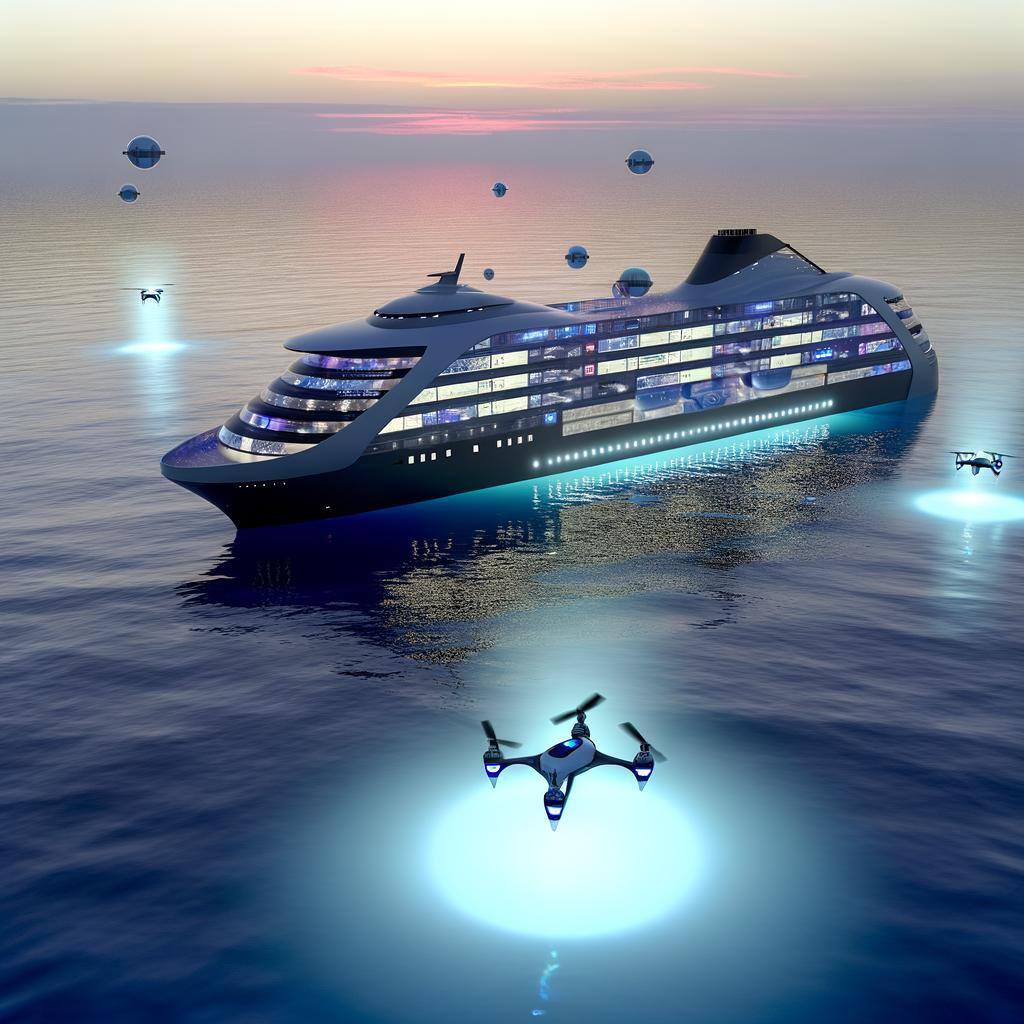
Sailing into the Future: Impact of Technology on Cruise Industry

Explore how cutting-edge technology is revolutionizing the cruise industry, enhancing passenger experiences and streamlining operations.
Navigating the Seas with Advanced Technology: The Role of AI and IoT in Modern Cruising
The cruise industry is embracing advanced technology to enhance navigation and safety at sea. Artificial Intelligence (AI) and the Internet of Things (IoT) are playing a crucial role in modern cruising, allowing ships to navigate the seas more efficiently and effectively. AI-powered systems analyze vast amounts of data, including weather patterns, sea conditions, and ship performance, to optimize routes and improve fuel efficiency. IoT devices and sensors enable real-time monitoring of various ship systems, providing valuable insights for maintenance and ensuring smooth operations.
With AI and IoT, cruise companies can also enhance safety measures. AI-powered surveillance systems can detect potential risks and alert crew members, helping to prevent accidents and ensure passenger safety. IoT devices can monitor important parameters such as fire detection, water levels, and structural integrity, enabling early detection of any issues and allowing for timely interventions. By leveraging AI and IoT, cruise companies are able to navigate the seas with advanced technology, ensuring a safer and more efficient cruising experience for passengers.
Enhanced Passenger Experience Through Virtual Reality and Personalization
Technology is transforming the passenger experience on cruise ships, offering new and exciting ways for guests to immerse themselves in the journey. Virtual Reality (VR) is one such technology that is being used to provide passengers with unique experiences. VR headsets can transport guests to virtual landscapes and destinations, allowing them to explore different places without leaving the ship. From virtual tours of historical landmarks to underwater adventures, VR enhances the onboard entertainment and enriches the overall cruise experience.
Personalization is another aspect of technology that is revolutionizing the passenger experience. Cruise companies are using data analytics and AI algorithms to gather information about passengers' preferences and provide personalized recommendations and services. From customized itineraries to tailored dining options, passengers can enjoy a more personalized and enjoyable cruise experience. Technology is enabling cruise companies to create unforgettable moments for their guests, making every journey an exceptional one.
Green Cruising: How Technology is Steering Eco-friendly Innovations
In recent years, the cruise industry has been actively adopting eco-friendly practices and technologies to reduce its environmental impact. Technology plays a crucial role in steering these eco-friendly innovations. From hybrid propulsion systems to advanced waste management solutions, cruise companies are leveraging technology to minimize their carbon footprint and preserve the delicate marine ecosystem.
One notable technology driving eco-friendly innovations in the cruise industry is the use of LNG (liquefied natural gas) as a fuel source. LNG-powered ships emit significantly less sulfur dioxide, nitrogen oxide, and particulate matter compared to traditional diesel-powered vessels. This cleaner fuel option helps reduce air pollution and contributes to a greener cruising experience.
Additionally, cruise companies are investing in advanced waste management technologies to ensure responsible disposal of waste generated onboard. These technologies include advanced recycling systems, wastewater treatment plants, and energy-efficient waste incinerators. By implementing these technologies, cruise companies are able to minimize the environmental impact of their operations and promote sustainable cruising.
Ensuring Passenger Safety: Cutting-Edge Tech Solutions for Modern Cruises
Passenger safety is a top priority for cruise companies, and technology is playing a vital role in ensuring a safe cruising experience. Cutting-edge tech solutions are being implemented to enhance safety measures and emergency response capabilities.
One such technology is the use of advanced surveillance systems powered by AI. These systems can detect and analyze potential security threats in real-time, allowing crew members to take immediate action. AI algorithms can identify suspicious behaviors or objects, monitor crowd movements, and detect anomalies, ensuring a high level of security onboard.
In addition to surveillance systems, cruise companies are also equipping their ships with state-of-the-art communication and emergency response systems. These systems enable seamless communication between crew members, allowing for swift coordination during emergencies. Advanced life-saving equipment, such as automated external defibrillators (AEDs) and emergency evacuation systems, are also being deployed to ensure the safety and well-being of passengers.
With the help of cutting-edge tech solutions, cruise companies are able to provide a safe and secure environment for passengers, giving them peace of mind throughout their journey.

The Future is Now: Emerging Technologies Shaping Tomorrow's Cruises
The cruise industry is constantly evolving, and emerging technologies are shaping the future of cruises. From smart ships to immersive experiences, these technologies are poised to transform the way we cruise.
One emerging technology that holds immense potential is 5G connectivity. With ultra-fast and reliable internet speeds, 5G can enable a whole new level of connectivity and digital experiences onboard. Passengers will be able to enjoy seamless streaming, immersive virtual reality, and real-time communication with their loved ones on land.
Another technology that is set to revolutionize cruises is automation. From self-driving tenders to robotic bartenders, automation is streamlining operations and enhancing efficiency onboard. Automated systems can handle repetitive tasks, freeing up crew members to focus on providing personalized services and creating memorable experiences for passengers.
Furthermore, the integration of artificial intelligence and machine learning will enable cruise companies to gain valuable insights from vast amounts of data. AI algorithms can analyze passenger preferences, optimize resource allocation, and anticipate maintenance needs, leading to more personalized experiences and cost-effective operations.
The future of cruises is exciting, with technology paving the way for innovative and extraordinary journeys. As cruise companies continue to embrace emerging technologies, passengers can look forward to a whole new level of comfort, convenience, and adventure.


